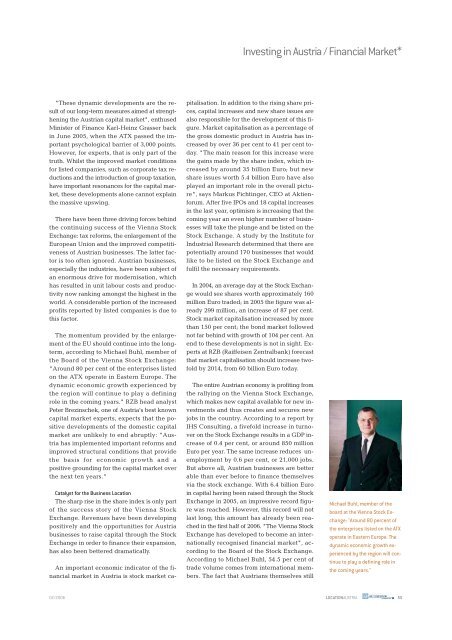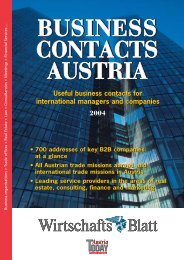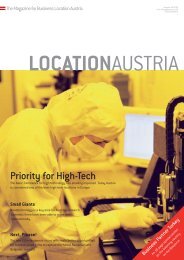Green Austria
Green Austria
Green Austria
Create successful ePaper yourself
Turn your PDF publications into a flip-book with our unique Google optimized e-Paper software.
"These dynamic developments are the result<br />
of our long-term measures aimed at strengthening<br />
the <strong>Austria</strong>n capital market", enthused<br />
Minister of Finance Karl-Heinz Grasser back<br />
in June 2005, when the ATX passed the important<br />
psychological barrier of 3,000 points.<br />
However, for experts, that is only part of the<br />
truth. Whilst the improved market conditions<br />
for listed companies, such as corporate tax reductions<br />
and the introduction of group taxation,<br />
have important resonances for the capital market,<br />
these developments alone cannot explain<br />
the massive upswing.<br />
There have been three driving forces behind<br />
the continuing success of the Vienna Stock<br />
Exchange: tax reforms, the enlargement of the<br />
European Union and the improved competitiveness<br />
of <strong>Austria</strong>n businesses. The latter factor<br />
is too often ignored. <strong>Austria</strong>n businesses,<br />
especially the industries, have been subject of<br />
an enormous drive for modernisation, which<br />
has resulted in unit labour costs and productivity<br />
now ranking amongst the highest in the<br />
world. A considerable portion of the increased<br />
profits reported by listed companies is due to<br />
this factor.<br />
The momentum provided by the enlargement<br />
of the EU should continue into the longterm,<br />
according to Michael Buhl, member of<br />
the Board of the Vienna Stock Exchange:<br />
"Around 80 per cent of the enterprises listed<br />
on the ATX operate in Eastern Europe. The<br />
dynamic economic growth experienced by<br />
the region will continue to play a defining<br />
role in the coming years." RZB head analyst<br />
Peter Brezinschek, one of <strong>Austria</strong>'s best known<br />
capital market experts, expects that the positive<br />
developments of the domestic capital<br />
market are unlikely to end abruptly: "<strong>Austria</strong><br />
has implemented important reforms and<br />
improved structural conditions that provide<br />
the basis for economic growth and a<br />
positive grounding for the capital market over<br />
the next ten years."<br />
Catalyst for the Business Location<br />
The sharp rise in the share index is only part<br />
of the success story of the Vienna Stock<br />
Exchange. Revenues have been developing<br />
positively and the opportunities for <strong>Austria</strong><br />
businesses to raise capital through the Stock<br />
Exchange in order to finance their expansion,<br />
has also been bettered dramatically.<br />
An important economic indicator of the financial<br />
market in <strong>Austria</strong> is stock market ca-<br />
Investing in <strong>Austria</strong> / Financial Market*<br />
pitalisation. In addition to the rising share prices,<br />
capital increases and new share issues are<br />
also responsible for the development of this figure.<br />
Market capitalisation as a percentage of<br />
the gross domestic product in <strong>Austria</strong> has increased<br />
by over 36 per cent to 41 per cent today.<br />
"The main reason for this increase were<br />
the gains made by the share index, which increased<br />
by around 35 billion Euro; but new<br />
share issues worth 5.4 billion Euro have also<br />
played an important role in the overall picture",<br />
says Markus Fichtinger, CEO at Aktienforum.<br />
After five IPOs and 18 capital increases<br />
in the last year, optimism is increasing that the<br />
coming year an even higher number of businesses<br />
will take the plunge and be listed on the<br />
Stock Exchange. A study by the Institute for<br />
Industrial Research determined that there are<br />
potentially around 170 businesses that would<br />
like to be listed on the Stock Exchange and<br />
fulfil the necessary requirements.<br />
In 2004, an average day at the Stock Exchange<br />
would see shares worth approximately 160<br />
million Euro traded; in 2005 the figure was already<br />
299 million, an increase of 87 per cent.<br />
Stock market capitalisation increased by more<br />
than 150 per cent; the bond market followed<br />
not far behind with growth of 104 per cent. An<br />
end to these developments is not in sight. Experts<br />
at RZB (Raiffeisen Zentralbank) forecast<br />
that market capitalisation should increase twofold<br />
by 2014, from 60 billion Euro today.<br />
The entire <strong>Austria</strong>n economy is profiting from<br />
the rallying on the Vienna Stock Exchange,<br />
which makes new capital available for new investments<br />
and thus creates and secures new<br />
jobs in the country. According to a report by<br />
IHS Consulting, a fivefold increase in turnover<br />
on the Stock Exchange results in a GDP increase<br />
of 0.4 per cent, or around 850 million<br />
Euro per year. The same increase reduces unemployment<br />
by 0.6 per cent, or 21,000 jobs.<br />
But above all, <strong>Austria</strong>n businesses are better<br />
able than ever before to finance themselves<br />
via the stock exchange. With 6.4 billion Euro<br />
in capital having been raised through the Stock<br />
Exchange in 2005, an impressive record figure<br />
was reached. However, this record will not<br />
last long; this amount has already been reached<br />
in the first half of 2006. "The Vienna Stock<br />
Exchange has developed to become an internationally<br />
recognised financial market", according<br />
to the Board of the Stock Exchange.<br />
According to Michael Buhl, 54.5 per cent of<br />
trade volume comes from international members.<br />
The fact that <strong>Austria</strong>ns themselves still<br />
Michael Buhl, member of the<br />
board at the Vienna Stock Exchange:<br />
"Around 80 percent of<br />
the enterprises listed on the ATX<br />
operate in Eastern Europe. The<br />
dynamic economic growth experienced<br />
by the region will continue<br />
to play a defining role in<br />
the coming years."<br />
02/2006 LOCATIONAUSTRIA 55






